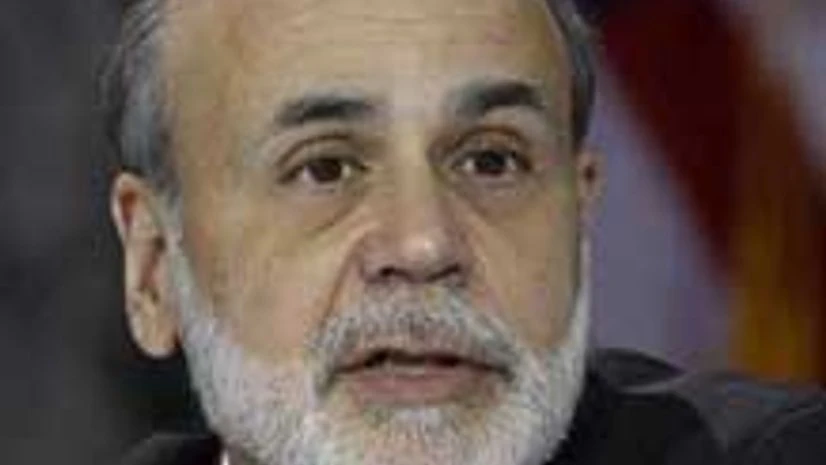Federal Reserve Chairman Ben Bernanke said on Wednesday the US economy is expanding strongly enough for the central bank to begin slowing the pace of its bond-buying stimulus later this year.
Bernanke’s confirmation that the Fed is getting closer to pulling back on its $85 billion in monthly asset purchases confirmed investor fears, sending stocks and bonds sharply lower and pushing benchmark Treasury yields to a 15-month high.
Moderate growth should lead to a further healing in the job market as headwinds facing the economy ease, Bernanke said. He also said policymakers expect inflation to move back up toward their long-term 2 per cent goal.
More From This Section
"The committee currently anticipates that it will be appropriate to moderate the monthly pace of purchases later this year, and if the subsequent data remain broadly aligned with our current expectations for the economy, we will continue to reduce the pace of purchases in measured steps through the first half of next year, ending purchases around mid-year," Bernanke said.
He added that the jobless rate should have declined to near 7 per cent from its current rate of 7.6 per cent by the time bond purchases are halted. If its forecasts proved too optimistic, the Fed could stop reducing its bond purchases or even raise them again, Bernanke said.
The Standard & Poor's 500 stock index .SPX closed down nearly 1.4 per cent, while yields on the 10-year US Treasury note hit 2.36 per cent, the highest level since March 2012, as traders recalibrated bets to account for a more hawkish Fed. The dollar also strengthened.
In a change of policy, Bernanke also said a majority of Fed policymakers believe the central bank should hang onto the mortgage assets it acquired through its unconventional monetary stimulus when it decides to tighten monetary policy.
He made the statements at a news conference on the Fed's decision to continue buying $40 billion in mortgage-backed securities and $45 billion in longer-term US government securities each month.
After a two-day meeting, the Fed's policy-setting panel offered a more upbeat assessment of the risks facing the economy than it have given after the last meeting in May. "The committee sees the downside risks to the outlook for the economy and the labour market as having diminished since the fall," it said.
A Reuters poll of 17 top Wall Street bond dealers found that 16 expect a reduction in the Fed's asset purchases by year-end, with a plurality pegging the central bank's September meeting as the starting point. These dealers saw the Fed slowing its bond purchases by $10 billion to $28 billion on that first pass, with a median response of $20 billion.
Rate rise not seen until 2015
Bernanke stressed that a slower pace of bond buying would still be adding support to the economy, and that any decision to begin removing stimulus remained a long ways off. Any eventual increases in interest rates would also be gradual, he added. "They do indeed plan to taper purchases later this year and hope to be done by next summer. Bernanke wants to communicate that this is not necessarily tightening, but the market may not see it that way," said Axel Merk, president and chief investment officer of Merk Investments in Palo Alto, California.
Esther George, the president of the Kansas City Fed, again dissented against the Fed's expansion of its support for the economy, expressing concern it could fuel financial imbalances and hurt the central bank's goal of keeping inflation contained. She has dissented at every policy meeting since January.
But in a surprise, the St Louis Fed chief, James Bullard, also dissented, though in the opposite direction, arguing the Fed should have signaled more strongly its willingness to keep its stimulus in place to defend its 2 per cent goal for inflation.
In its statement, the Fed repeated that it would not raise rates until unemployment hits 6.5 per cent or lower, provided that the outlook for inflation stays under 2.5 per cent.
FED CHIEF’S READING OF US ECONOMY
US Federal Reserve Chairman Ben Bernanke said central bank could pare its bond buying later this year. Here’s what he touched on:
- Bernanke said the US economy is expanding strongly enough for the central bank to begin slowing the pace of its bond-buying stimulus later this year
- He confirmed that the Fed is getting closer to pulling back on its $85 billion in monthly asset purchases
- Moderate growth should lead to a further healing in the job market
- Policy-makers expect inflation to move back up toward their long-term 2% goal
- Jobless rate should have declined to near 7% from its current rate of 7.6% by the time bond purchases are halted
- If its forecasts proved too optimistic, the Fed could stop reducing its bond purchases or even raise them again

)
